
JAN 2023
Helping the tea pickers of Bangladesh to flourish, in Jesus’ name!
The tea pickers enjoy drinking tea and catching up with one another after a hot and tiring morning picking the leaves.

PAGE 2 — WELCOME
Photo © Ruth Towell
Dear friend
Welcome to the first issue of New Day in 2023. As we start the year, I pray that you have a blessed and happy New Year, and that God would supply all your needs.
Thank you for continuing to stand with people affected by leprosy. Your compassion as we seek to end leprosy together is truly humbling. I’ve recently returned from a visit to leprosy hospitals in India, and every patient I sat with shared that your love had given them hope.

In this edition of New Day, and over the next few months, you can journey with us to the beautiful tea gardens of Bangladesh. If you’re anything like me, no excuse is needed for a lovely cup of tea, whether at the start of the day, or while catching up with friends. Tea is something that brings us together.
Around 600,000 people live or work in the vast tea estates of Sylhet in Bangladesh. From the tea pickers to the workers in the processing plants, tea is an industry binding people together. Just before lockdown
I had the privilege of visiting my colleagues carrying out leprosy work in Dhaka. The conditions in the capital city’s slums were not only distressing, but ripe for disease. It seemed almost inevitable that leprosy would thrive here.
I was startled to learn, though, that leprosy is attacking Bangladesh’s lush tea gardens like an invasive weed. Just a few hours’ drive from the bustling capital the air is fresh and fragrant. The vibrancy of the foliage creates a tranquillity that is the perfect antidote to the city noise. But while the tea gardens flourish, leprosy is ruining the lives of its workforce.
I was staggered to hear that as many as one in seven people living on the vast tea estates are thought to have leprosy. The more our team look, the more cases they find. Almost no family remains untouched. This is not God’s plan for these dear people!
The amazing Leprosy Mission team in Bangladesh has appealed for our help. If we are able to upscale our work there, we can rid the tea gardens of the toxic weed that is leprosy. No longer will the tea workers and their families, even young children, be disabled by this curable disease. In Jesus’ name they can flourish!
By God’s grace and your faithful support, we can treat leprosy, prevent disability and protect livelihoods. I ask you to prayerfully consider joining with us to bring justice to this most urgent situation.
Please pray for the people living and working in the tea gardens of Bangladesh, that we might reach each and every one in need of treatment. Together we can bring health, hope and prosperity to these precious people, restoring the plan God has for them.
God bless you
Peter Waddup Chief Executive
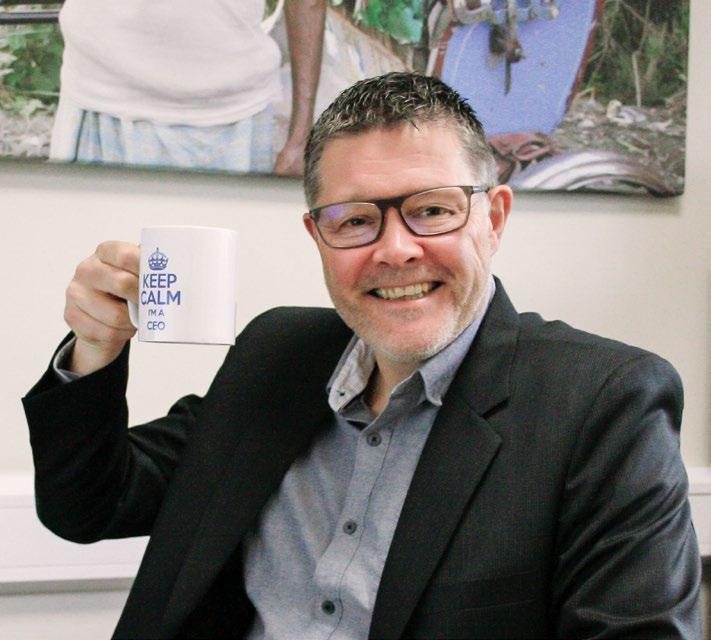
WELCOME — PAGE 3
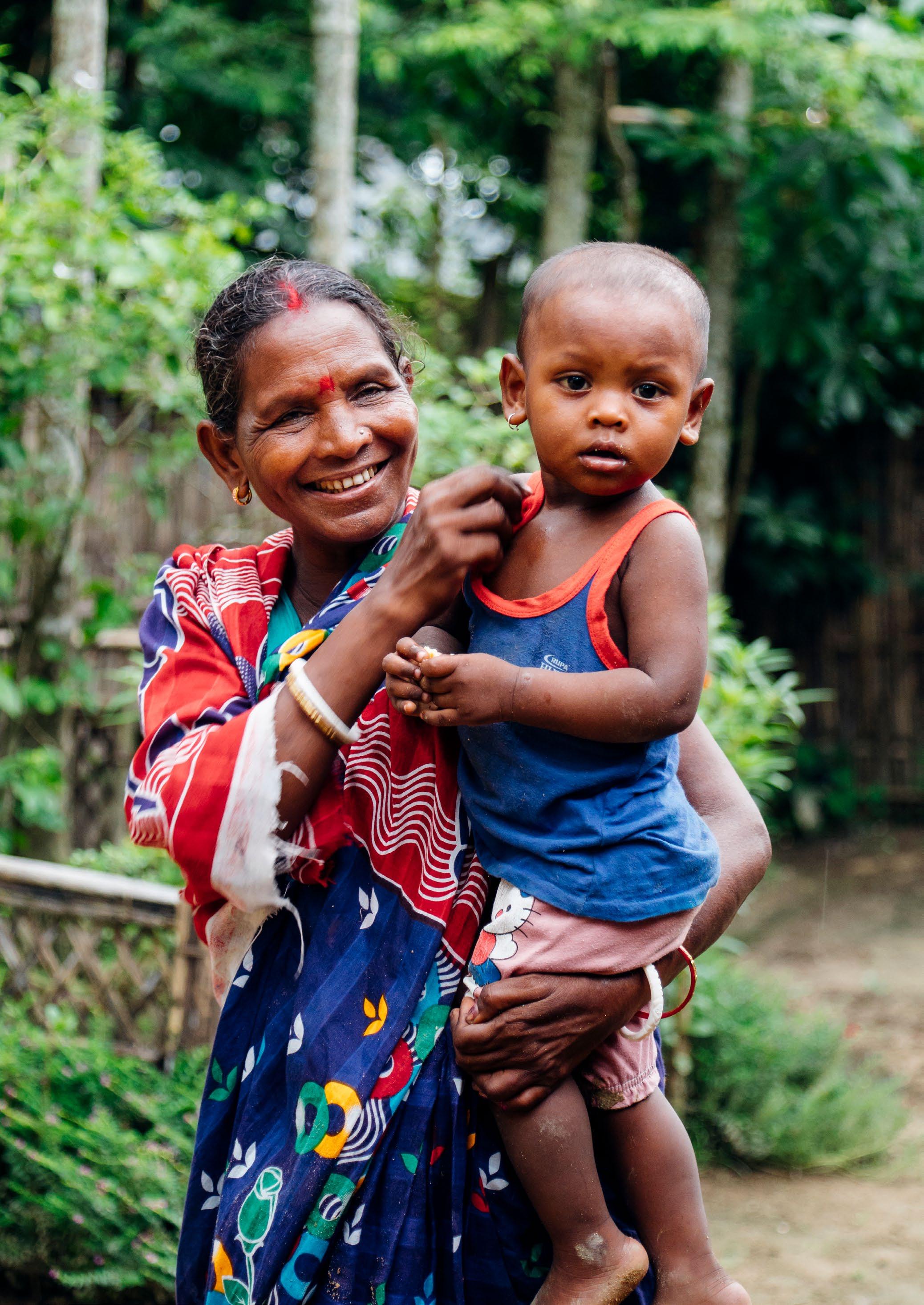
PAGE
Aloka with her 16-month-old grandson Ajoy.
4 — ALOKA’S STORY
Photo © Ruth Towell
A day in the life of a tea picker
Meet Aloka…
Aloka has worked as a tea picker in Sylhet, the north-eastern tip of Bangladesh, since she was a teenager. Sylhet’s gentle rolling hills and subtropical climate are perfect for growing tea. In fact, the area has the highest tea production in Bangladesh.
Aloka has never known life anywhere else. Sylhet is her home and where her heart lies. While her life is one of hard toil, she gives thanks for the many blessings God has given her. The proud mum of four, and now grandmother of three, is a true matriarch. She is the linchpin holding her family together. Not only is she the main breadwinner, but the family live in a house provided by her employers. It is the simplest of houses with a corrugated iron roof, on which the rain hammers down during monsoon.
Now grown up, their son and one of their daughters and their families live with Aloka and their father, Sunil. Aloka cannot wait to get home each evening and spend time playing with her youngest grandson, Ajoy. He really is the apple of her eye.
Aloka is not only held in the highest esteem by her family, but also by her colleagues. She was chosen by her fellow workers to represent the tea gardens at a recent meeting with the prime minister of Bangladesh!
MORNING ROUTINE
Each morning Aloka makes breakfast for the family before setting off on the long walk to the tea gardens. Often the mud track outside her home is flooded. There is nowhere for the water to drain following the heavy rains. Aloka is undeterred as she
hitches up the hem of her colourful saree to wade through the flood water.
En route to the tea gardens she meets her friends, and they share stories of their growing families. She enjoys the camaraderie and acceptance. The tea pickers have known each other for decades and are as close as can be. Working long hours in the intense heat and humidity is tiring. But Aloka is just thankful that she is still able to work. She knows of so many others for whom the picture has been far bleaker.
A couple of years ago, Aloka noticed a discoloured skin patch on her left hand. She carried on working as it didn’t seem to cause her any problem at first. But over time she started to lose the strength in her hand. Her fingers began to stiffen and she had trouble straightening them.
TREATMENT
Thanks to you, a Leprosy Mission worker on the estate recognised the symptoms of leprosy. Aloka was able to get treatment to cure the disease. But tragically, the cure came too late to prevent damage to her left hand. She’s lost all feeling. Her fingers won’t straighten and they can’t grip the delicate tea leaves. This means Aloka can now only pick tea leaves with her right hand. As she is paid by the kilogram, she earns a fraction of what she once did, impacting her entire family.
She says: “When I first heard the word ‘leprosy’ I was so frightened. If The Leprosy Mission was not here to help me, I am sure I would die.”
ALOKA’S STORY — PAGE 5
Above are Aloka’s hands. The fingers on her left hand will no longer straighten as a result of leprosy. Aloka can only pick tea leaves with her right hand. As she is paid per kilogram of leaves picked, her income has plummeted.

“I’m so thankful that I was found and given the medicine I needed. But I’m sad that I was cured too late. I need help to make my hand work again. I want to look after my family and I can’t pick enough tea now to bring home a decent wage.”
If Aloka had been left untreated for much longer, she would have lost all feeling in both hands. She has seen it happen to those around her. The decline would have been gradual until the day her hands became useless. On that dreadful day she would not only have lost her job, but the family home as well. She shudders to think how life could have been if they had been evicted from the tea estate. They would have lost everything.
INDEPENDENCE
Aloka does her utmost to push the dark thoughts aside and remain resolute and positive. She throws herself into running a self-help group for others affected by leprosy. Doing something constructive for the other workers helps her too. In the self-help group the members check each other for cuts on their numb feet. They do this to stop wounds becoming infected and prevent disability. They also run a savings group to encourage financial independence.
After a long day in the tea gardens Aloka collects firewood on her way home. Her face lights up when
her grandson, Ajoy, runs to greet her. She and her daughter chat over the open fire as they cook dinner. Aloka has to take great care because she cannot feel the heat of the fire on her left hand. It’s important she doesn’t forget this.
Aloka still needs medical support to stop her fingers from clawing even more. If the effects of leprosy prevent her from working, Aloka says: “There would be no point in me living anymore.”
Despite the challenges she faces, Aloka knows she is one of the fortunate ones. There are many like her who urgently need medical care. She does everything she can to help, saying: “It’s so important for anyone with leprosy to get treatment quickly. I try to support people. If someone has a discoloured patch on their skin, I ask if I can check whether they can feel me touching the patch. If they can’t feel it, then I make sure they see a health worker for treatment. I want there to be no more leprosy in the tea gardens.”
Thank you for your love for people like Aloka. Will you join her mission to end leprosy in the tea gardens of Bangladesh? Through your compassion, you can free Aloka and so many precious people like her from a disease that steals hope, dreams, and independence.
PAGE 6 — ALOKA’S STORY
Photo © Ruth Towell

ALOKA’S STORY — PAGE 7
Be strong and courageous. Do not be afraid, do not be discouraged, for the Lord your God will be with you wherever you go.
Joshua 1:9 (NIV)
Photo © Ruth Towell
‘People affected by leprosy deserve love and affection. It’s what Jesus taught us.’

Smita feels a true peace as she stands in the tea gardens wearing their coat of dew in the early morning sunlight. She watches with joy as the tea pickers bustle into the fertile gardens. They are full of smiles as they greet one another, enjoying the freshness and hope a new day brings. Their distant chatter comes to the foreground, overriding the birdsong and gentle breeze.
Wearing tidy triangular hats, the women file along the neat rows of tea bushes. They begin picking the emerald leaves, tossing them into the empty baskets balanced on their backs.
The hard day’s work ahead of them does not phase these women. They consider themselves fortunate. Working in the tea gardens means they are given a home and belong to a close-knit community. If you ask the question why tea pickers tend to be women, the answer given is that smaller hands are an advantage. Many learnt the art of niftily swiping the leaves from their stems from their mothers. Speed and efficiency are everything when you are paid by the kilogram.
28-year-old Smita is a Leprosy Mission community health worker, visiting tea gardens across Bangladesh. She feels the weight of responsibility this morning as she watches the women begin their day. The latest statistics
point to as many as one in seven of the tea community having leprosy. In fact, the tea gardens of Bangladesh are home to the highest concentration of leprosy cases in the world. We know that almost every family is affected. It is only because of you that health workers like Smita are finding several hundred new cases each year so that the healing process may begin. Your compassion and kindness are saving so many workers on the vast tea estates from a lifetime of disability.
There is a real urgency to find new leprosy cases if together we are to rid the tea gardens of this disease. The thought of missing a case is almost too much for Smita to bear. A tea picker’s hands are her tools. Nerve damage caused by leprosy can leave fingers clawed and unable to straighten. Should a tea picker’s hands be rendered useless, she can lose everything she knows and loves.
Smita reminds herself that she was called by God to do this work and that He will equip her. He gave her a special love for people affected by leprosy from a young age. This love came through her father who worked in a hospital, dressing the wounds of leprosy patients. She saw the compassion he showed each one of his patients, many of whom had been outcast from society. His example inspired her. She was still a child when her parents became Christians.
PAGE 8 — SECTION / PAGE TITLE
PAGE 8 — SMITA’S MINISTRY
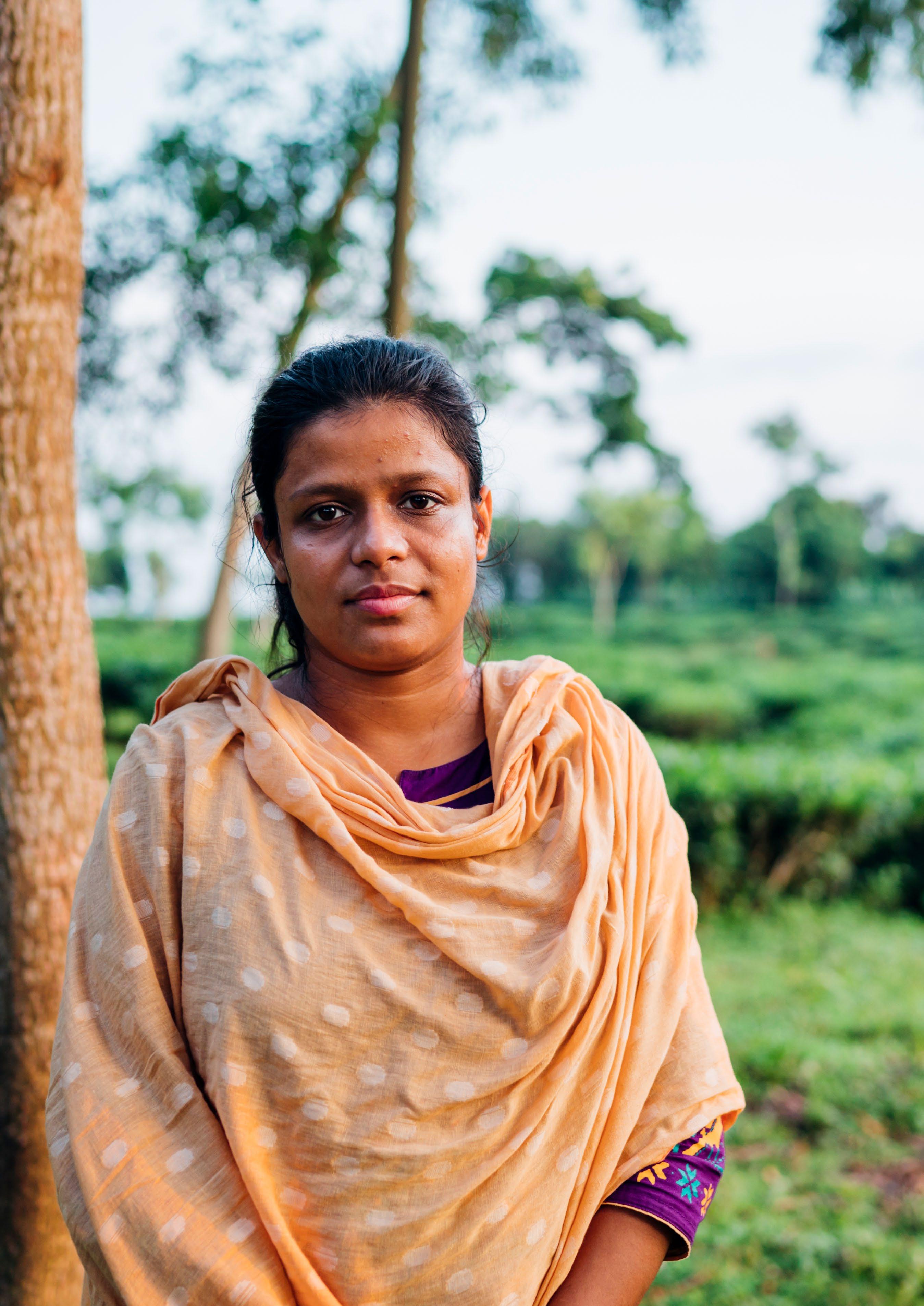
SMITA’S MINISTRY — PAGE 9
Photo © Ruth Towell
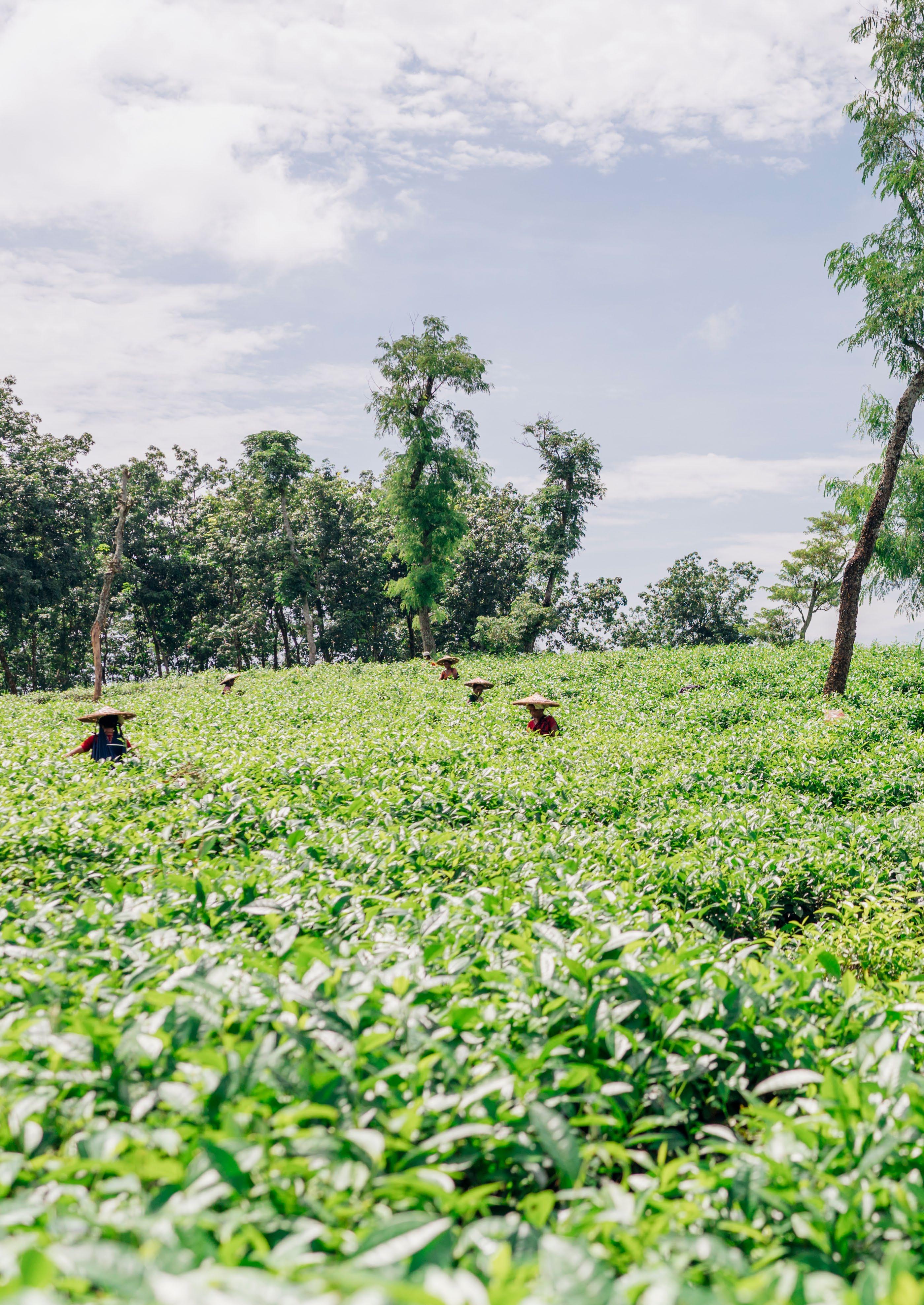
PAGE 10 — SMITA’S MINISTRY
Isaiah 45:8 (NIV)
Let the earth open wide, let salvation spring up, let righteousness flourish with it.
Smita’s ministry
She became a Christian herself and, driven by her personal faith, she followed the path God had prepared for her.
Smita enjoys getting to know the tea pickers and gaining their trust. She talks to them about the early signs of leprosy. A slightly discoloured skin patch can easily be shrugged off as nothing, but to her it is a red warning light. She knows that early diagnosis and cure is the only way that someone can live life to the full, as God intended. After a tea garden resident is newly diagnosed, she always checks their family members for symptoms too. Often, she finds more than one member of a family is affected by this insidious disease that hides in plain sight.
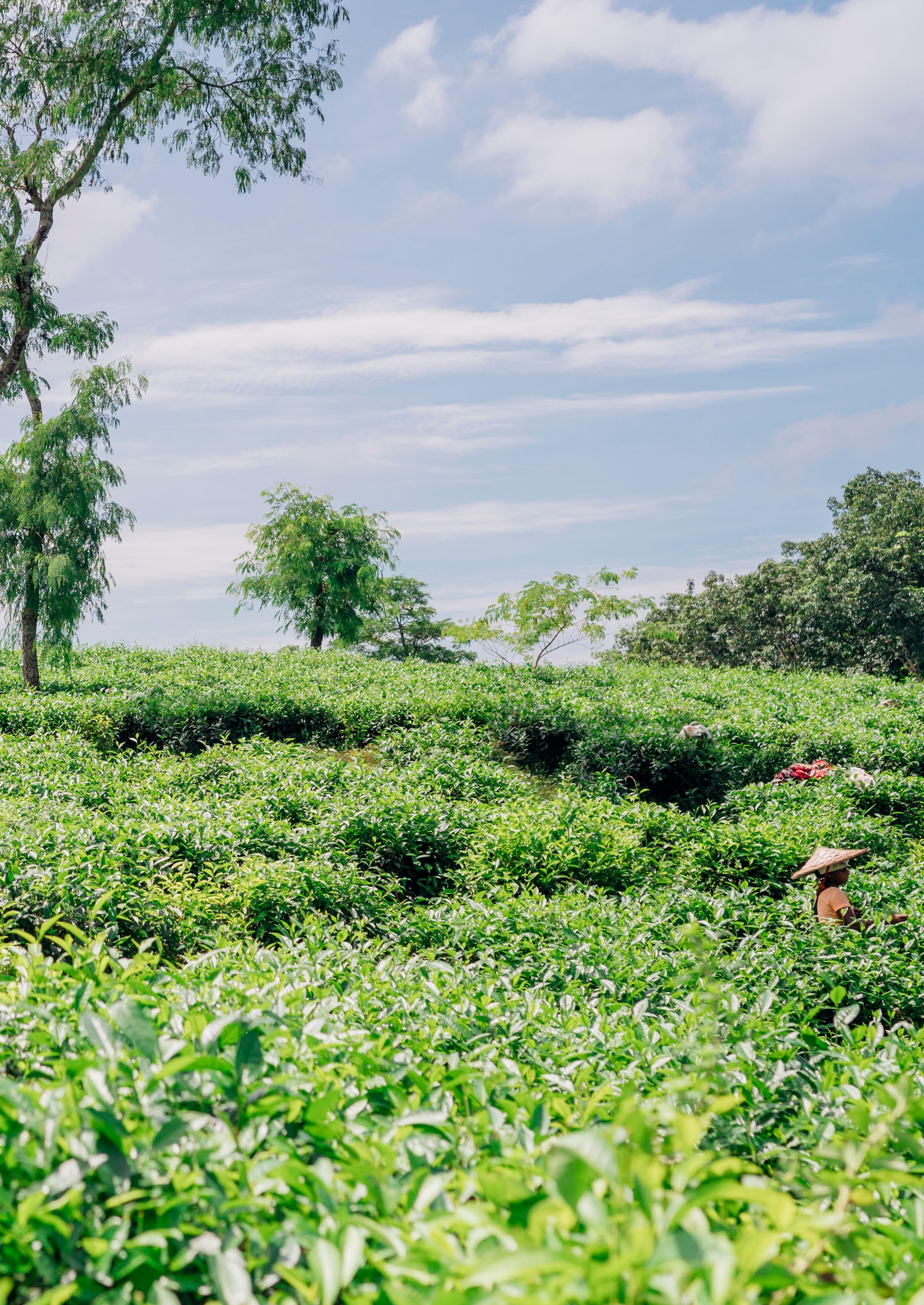
As well as diagnosing new cases, Smita is a friend to everyone on their leprosy treatment journey. She invites them to join self-help groups where she teaches them to care for hands and feet that are numb because of leprosy. Members of the group are also encouraged to build financial independence by saving together. This mutual cooperation can be life-changing. They develop real pride in the skills they learn and what they go on to achieve.
Smita relishes the work she does. Her faith and kindness are everything.
Smita
SMITA’S MINISTRY— PAGE 11
Photo © Ruth Towell
says: "People affected by leprosy deserve love and affection and I can give that by working for them. It is what Jesus taught us. If The Leprosy Mission was not here, it would not be possible to control leprosy in this country.”
A picture of health and happiness
Beautiful Kobita is just eight years old. Smita recently diagnosed her with leprosy at a pop-up clinic. Her teacher had noticed a discoloured skin patch on her face and knew it could be a sign of leprosy. This was devastating news for the family. Her mother is a tea picker, and her father works as a security guard. She is one of six daughters and her family live hand to mouth. Life is a struggle.
The young girl’s mother was desperate. Where would they find treatment for their daughter? Then how would they find the money to cover the cost? Thankfully, they heard of a pop-up clinic happening in their village. At the clinic Smita greeted Kobita warmly and, with kindness and compassion, calmed
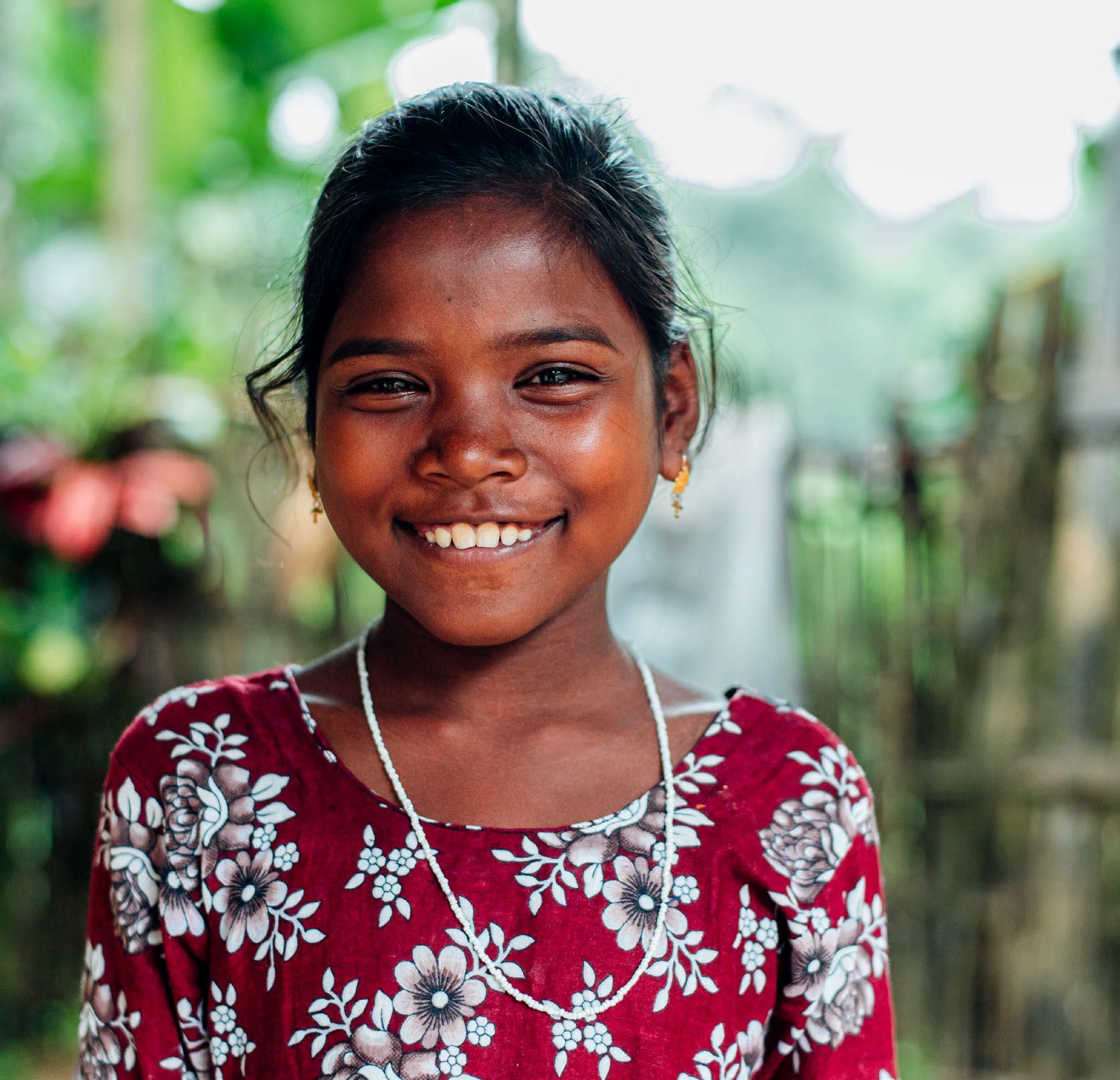
her fears about leprosy. Kobita is now taking the cure and, thanks to you, will make a full recovery. She wants to be able to work when she is older to help her parents. She says: “I was really frightened about having leprosy, but I am ok now.”
Kobita’s father said he is so thankful that his daughter’s leprosy was found at an early stage. There are many cases of leprosy in their village, and he has seen how badly it can affect people. He knows it is very serious if there is a late diagnosis or if people do not finish their course of medication. He asked that we say thank you to you, our incredible supporters, for bringing the cure to his daughter. Without you, he and his wife would not have known where to turn.
PAGE 12 — A PICTURE OF HEALTH AND HAPPINESS
Photo © Ruth Towell
Marking the end of an era
We would like to say a huge thank you to everyone who has collected used stamps for us over many decades. So many of you have taken the time to meticulously trim and parcel up stamps to send to our office. It’s been such a joy to receive all your stamps, old coins and postcards. They’re really parcels of love! And this love has raised thousands of pounds to change lives across Asia and Africa. You have given people affected by leprosy healing, restoration and hope.
It is hard to imagine that rescuing stamps destined for the recycling bin has changed so many lives! We can never thank you enough for the time, effort and love that you have put into this ministry.
STEWARDSHIP
It will probably come as no surprise to hear that in the last couple of years the value of used stamps has sharply declined. Following the introduction of bar-coded stamps, their value has further decreased. Sadly, it has now got to the point where we cannot make enough money for this venture to continue. Good stewardship of funds and resources has to be at the forefront of everything we do, to ensure we can send as much money as possible to help people affected by leprosy.
So, like many other charities, it is with regret that we have made the decision to wind down stamps and collectables. We can continue to accept your collections until the end of March. After this date, you may find an outlet to sell stamps yourself. We’d love to encourage you to do this and send a donation, continuing your faithful support for people with leprosy.
We realise this is disappointing news for both our supporters and volunteers. Thank you for all you have done for people affected by leprosy through this ministry.
GRATEFUL
There are so many people to thank, and we are most grateful for each parcel of stamps we receive. We would like to say a special thank you to 97-year-old Josie Riddiough. For almost 40 years, Josie has collected stamps for The Leprosy Mission. She has earned the title of ‘the stamp lady’ among friends and family who seek her out with their collections! Josie has even continued her dedicated work from her London care home. God bless you Josie for your heart for people affected by leprosy.

Volunteers have kept the stamps and collectables operation going for many years. We thank them for the generous gift of their time. Pictured is Mandy Vergalen in our Peterborough office. She has spent hundreds of hours preparing stamps to sell to collectors.

MARKING THE END OF AN ERA — PAGE 13
Will you help uproot the weed of leprosy in Bangladesh?

As you will have read through this edition of New Day, leprosy is spreading so fast in the tea gardens of Bangladesh that nearly every family is affected. To stop this, everyone needs to play their part. People affected by leprosy need your help more than ever.
If we don’t act now, leprosy will continue to ravage people’s lives. More and more precious people will be at risk from life-changing disabilities caused by this dreadful disease.
Can you imagine how Aloka felt when she found out that she had leprosy? Desperate fear and worry. How could she provide for her family? Would they lose their home? Today there are so many mothers and grandmothers working in the tea gardens, carrying these same fears along with their baskets of tea leaves.
Thankfully you are always there for people like Aloka, making sure there is love and care where it is needed most.
Aloka would not have had the cure for leprosy if a Leprosy Mission health worker hadn’t knocked on her door. Her hands would have deteriorated to the point that she would no longer be able to pick tea leaves at all. She would have lost her job. That would mean losing her home, and her family losing their community. Without you, she would have lost everything.
With the number of known cases of leprosy already so high, I’m sure you are asking the same questions that I did. ‘How many more people are there?’ and ‘What if we don’t find them?’ These are the very questions I’m asking you to think about today. If we don’t act now, many people affected by leprosy in the tea
gardens will not be found and cured. If we don’t act now, leprosy will spread. More people will become disabled. They will lose their jobs, their homes, and their community. The very support network that keeps them going.
Today you can play your part in uprooting the weed of leprosy in the tea gardens, once and for all. You can ensure that every person affected by leprosy is found and cured. Like Aloka, they can then continue to look after their families, earn a wage picking tea, and remain part of a community.
You can provide the cure to a person affected by leprosy for £24.
For £111, you can bring a pop-up skin camp to a tea garden to find more people affected by leprosy.
Your gift of £481 will train more health workers in the tea gardens, ensuring nobody gets left behind.
£1,018 will form and train a self-help group, ensuring every person affected by leprosy gets ongoing support and is part of a community.
Or a gift of £7,055 will provide the complete package of help for a whole tea garden, ensuring the community has everything needed to end leprosy for good.
What part will you play in ending leprosy in the tea gardens of Bangladesh?
Thank you so much, Peter
PAGE 14 — WILL YOU HELP?

WILL YOU HELP? — PAGE 15
Photo © Ruth Towell
cures one person of leprosy provides a pop-up clinic to a tea garden to find and cure people of leprosy trains health workers based in the tea gardens so every person with leprosy can be found and cured
builds a self-help group, ensuring people with leprosy have ongoing support and remain part of their community provides a complete package of help for a whole tea garden, so the community has the tools it needs to end leprosy for good
PAGE 16 — SECTION / PAGE TITLE Registered Charity No. 1050327 | A Company Limited by Guarantee Registered in England and Wales No. 3140347 01733
The
& Wales
The
Mission England, Wales, the Channel Islands and the Isle of Man, Goldhay Way, Orton Goldhay Peterborough, PE2 5GZ globe Facebook twitter INSTAGRAM
give what you can today:
370505 post@tlmew.org.uk leprosymission.org.uk/flourish
Leprosy Mission England
@leprosytalk leprosymission
Leprosy
Cover photo © Ruth Towell Please
£24 £111 £481 £1,018 £7,055
















